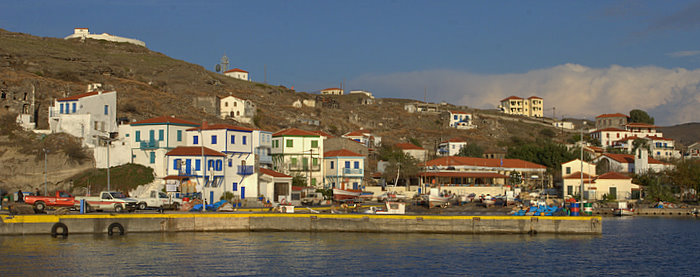Μαλλιά σγουρά, μαλλιά κοράκου χρώμα
που ανέμιζε ο αγέρας στα ζερβά
σας αγαπούσα πάντοτε και τώρα
η δόλια μου καρδιά στενάζει και πονά.
Πάει καιρός που έβγαινες στους δρόμους
τη σκούφια φόραγες λεβέντικα στραβά
και τα μαλλιά χυτά πάνω στους ώμους
τ’ ανέμιζε ο αγέρας στα ζερβά.
Θά `ρθουν καιροί, καιροί ευτυχισμένοι
σκλάβοι δε θα `ναι τότε οι λαοί
θα ζούμε τότε πια αδελφωμένοι
σε μια ελεύθερη ειρηνική ζωή.
Εγώ Άη Στράτη δε φοβάμαι
είναι κι αυτή μια Ελληνική γωνιά
τα μαύρα τα μαλλιά μας κι αν ασπρίσαν
δε μας τρομάζει η βαρυχειμωνιά.
που ανέμιζε ο αγέρας στα ζερβά
σας αγαπούσα πάντοτε και τώρα
η δόλια μου καρδιά στενάζει και πονά.
Πάει καιρός που έβγαινες στους δρόμους
τη σκούφια φόραγες λεβέντικα στραβά
και τα μαλλιά χυτά πάνω στους ώμους
τ’ ανέμιζε ο αγέρας στα ζερβά.
Θά `ρθουν καιροί, καιροί ευτυχισμένοι
σκλάβοι δε θα `ναι τότε οι λαοί
θα ζούμε τότε πια αδελφωμένοι
σε μια ελεύθερη ειρηνική ζωή.
Εγώ Άη Στράτη δε φοβάμαι
είναι κι αυτή μια Ελληνική γωνιά
τα μαύρα τα μαλλιά μας κι αν ασπρίσαν
δε μας τρομάζει η βαρυχειμωνιά.
inviata da Gian Piero Testa - 14/10/2013 - 11:49
Lingua: Italiano

Gian Piero Testa.
Traduzione italiana di Gian Piero Testa
Μετέφρασε στα ιταλικά ο Τζαν Πιέρο Τέστα
Italian translation by Gian Piero Testa
Traduction italienne de Gian Piero Testa
Gian Piero Testan italiankielinen käännös
CAPELLI RICCI
Capelli ricciuti color di corvo
che il vento agita alla sinistra
sempre vi amavo e ancora
il mio misero cuore sospira e pena.
Se ne è andato il tempo quando uscivi nelle strade
e alla brava portavi la cuffia sulle ventitré
con i capelli scompigliati sulle spalle
e il vento li agitava alla sinistra.
Verranno tempi, tempi fortunati
i popoli più non saranno schiavi
vivremo allora affratellati
in una vita di pace e libertà.
Non ho paura io di Ai Stratis [1]
anche quello è un angolo di Grecia
se anche sono bianchi i nostri capelli neri
non ci spaventa il peggiore degli inverni.
Capelli ricciuti color di corvo
che il vento agita alla sinistra
sempre vi amavo e ancora
il mio misero cuore sospira e pena.
Se ne è andato il tempo quando uscivi nelle strade
e alla brava portavi la cuffia sulle ventitré
con i capelli scompigliati sulle spalle
e il vento li agitava alla sinistra.
Verranno tempi, tempi fortunati
i popoli più non saranno schiavi
vivremo allora affratellati
in una vita di pace e libertà.
Non ho paura io di Ai Stratis [1]
anche quello è un angolo di Grecia
se anche sono bianchi i nostri capelli neri
non ci spaventa il peggiore degli inverni.
[1] Aghios Efstratios, comunemente abbreviato in Ai-Stratis, è il nome di una piccola e quasi disabitata isola dell'Egeo nordorientale, a sud di Lesbo, ritenuta particolarmente adatta, fin dai tempi più antichi, per esiliare e confinare chi venisse ritenuto nocivo per i potenti di volta in volta al potere. Nel corso della guerra civile e poi ancora nel periodo della Giunta dei Colonnelli, numerosissimi furono i combattenti dell'Esercito Democratico e gli oppositori che furono costretti a soggiornarvi. Oggi vi sorge un museo dell'esilio
inviata da Gian Piero Testa - 14/10/2013 - 11:50
Lingua: Italiano
Altra traduzione italiana / 'Αλλη μετάφραση στα ιταλικά / Alternative Italian translation / Autre traduction italienne / Muu italiankielinen käännös:
Riccardo Venturi, 25-03-2019
Nota. Non mi ero accorto che la canzone era stata già inserita e affrontata da “GPT” l'oramai lontano 14 ottobre 2013; poco più di un anno prima della sua scomparsa. Avevo già preparato una resa italiana, che comunque qui propongo accanto a quella di Gian Piero Testa. E' anche un modo per “tornare ai vecchi tempi” delle interminabili telefonate notturne tra me e il GPT (animali notturni par excellence) scambiandoci pareri e opinioni su questo o quel testo greco.
Riccardo Venturi, 25-03-2019
Nota. Non mi ero accorto che la canzone era stata già inserita e affrontata da “GPT” l'oramai lontano 14 ottobre 2013; poco più di un anno prima della sua scomparsa. Avevo già preparato una resa italiana, che comunque qui propongo accanto a quella di Gian Piero Testa. E' anche un modo per “tornare ai vecchi tempi” delle interminabili telefonate notturne tra me e il GPT (animali notturni par excellence) scambiandoci pareri e opinioni su questo o quel testo greco.
CAPELLI RICCI
Capelli ricci, capelli color corvino
che il vento scarmigliava a dritta e a manca,
vi ho sempre amati e vi amo ancora adesso
che il cuore mio infelice pena e geme.
Passato è il tempo che andavi per le strade
portando il berretto sulle ventitré da giovane gagliardo,
ed i capelli sciolti sulle spalle
li agitava il vento a dritta e a manca.
Verranno tempi, tempi fortunati
in cui più non saranno schiavi i popoli.
Vivremo allora ormai affratellati
Un'esistenza libera ed in pace.
Io non ho paura di Agiostrati, [1]
è anche quello un angolo di Grecia.
Coi nostri capelli neri, anche se si sono imbiancati,
non ci spaventa il tremendo inverno.
Capelli ricci, capelli color corvino
che il vento scarmigliava a dritta e a manca,
vi ho sempre amati e vi amo ancora adesso
che il cuore mio infelice pena e geme.
Passato è il tempo che andavi per le strade
portando il berretto sulle ventitré da giovane gagliardo,
ed i capelli sciolti sulle spalle
li agitava il vento a dritta e a manca.
Verranno tempi, tempi fortunati
in cui più non saranno schiavi i popoli.
Vivremo allora ormai affratellati
Un'esistenza libera ed in pace.
Io non ho paura di Agiostrati, [1]
è anche quello un angolo di Grecia.
Coi nostri capelli neri, anche se si sono imbiancati,
non ci spaventa il tremendo inverno.
[1] Si veda la nota 1 di Gian Piero Testa. L'isola di Sant'Eustratio, o Ai-Stratis, ha anche un nome italiano: “Agiostrati”, che qui utilizzo. Il campo di prigionia vi fu stabilito già dal 1929, e funzionò a pieno regime prima di essere chiuso nel 1962. Vi passarono prigionieri, tra gli altri, lo scrittore Dimitris Glenós, e i poeti Kostas Várnalis (l'autore della Ballata del Sor Medios), Giannis Ritsos (che vi scrisse, nel 1950, la Lettera a Joliot-Curie) e Tasos Livaditis (altra presenza assidua in questo sito). Durante la dittatura dei Colonnelli il campo di prigionia fu riaperto, appena in tempo per farvi passare anche Mikis Theodorakis; il 20 febbraio 1968 l'isola fu però colpita da un rovinoso terremoto del 7° grado della scala Richter, che la distrusse facendo oltre venti vittime tra gli abitanti (attualmente 270) e radendo al suolo tutto il campo, che fu definitivamente chiuso.


Agiostrati (Sant'Eustratio): l'unico villaggio dell'isola.
Lingua: Inglese
English translation / Μετέφρασε στα αγγλικά / Traduzione inglese / Traduction anglaise / Englanninkielinen käännös:
radiobuzzer © 11-03-2011
stixoi.info
radiobuzzer © 11-03-2011
stixoi.info
CURLY HAIR
Curly hair, of dark black colour,
that the air was blowing to your left
I've always loved you and now
my poor heart hurts.
It's been a while since you used to go down on the streets
you would put your cap on, in a proud way, a bit lop-sided
and your hair showering your shoulders
the wind was blowing it to your left.
There will be times, happy times,
when the nations won't be enslaved.
Then, we will all live like brothers and sisters,
a free peaceful life.
I am not afraid of Ai-Stratis [1],
this is also a piece of Greek land.
What if our dark hair went white
we are not afraid of the hard winter.
Curly hair, of dark black colour,
that the air was blowing to your left
I've always loved you and now
my poor heart hurts.
It's been a while since you used to go down on the streets
you would put your cap on, in a proud way, a bit lop-sided
and your hair showering your shoulders
the wind was blowing it to your left.
There will be times, happy times,
when the nations won't be enslaved.
Then, we will all live like brothers and sisters,
a free peaceful life.
I am not afraid of Ai-Stratis [1],
this is also a piece of Greek land.
What if our dark hair went white
we are not afraid of the hard winter.
[1] Aghios Efstratios, commonly abbreviated as Ai-Stratis, is the name of a small and almost uninhabited island in the northeastern Aegean, south of Lesbos, considered particularly suitable, since ancient times, to exile and confine those who were considered harmful to the establishment at the relevant time. During the civil war and then again during the period of the Regime of the Colonels, there were a lot of the Democratic Army’s fighters and opponents forced to stay there. Today there is an Exile Museum (Note by Gian Piero Testa)
The island of Saint Eustratius, or Ai-Stratis, also has an Italian name: "Agiostrati", which I use here. The prison camp was established there since 1929 and it worked at full capacity before it was closed in 1962. Many prisoners passed by there, among the others Dimitris Glenós, the poets Kostas Várnalis (the author of the Ballad of Mr. Medios), Giannis Ritsos (who wrote there the Letter to Joliot-Curie in 1950) and Tasos Livaditis (often covered by this website, too). During the dictatorship of the Colonels the prison camp was reopened, just in time to let Mikis Theodorakis pass too; on February 20, 1968, however, the island was struck by a disastrous earthquake of the 7th degree on the Richter scale, which destroyed it making over twenty victims among the inhabitants (currently 270) and razing the entire field, which was finally closed. (Note by Riccardo Venturi)
The island of Saint Eustratius, or Ai-Stratis, also has an Italian name: "Agiostrati", which I use here. The prison camp was established there since 1929 and it worked at full capacity before it was closed in 1962. Many prisoners passed by there, among the others Dimitris Glenós, the poets Kostas Várnalis (the author of the Ballad of Mr. Medios), Giannis Ritsos (who wrote there the Letter to Joliot-Curie in 1950) and Tasos Livaditis (often covered by this website, too). During the dictatorship of the Colonels the prison camp was reopened, just in time to let Mikis Theodorakis pass too; on February 20, 1968, however, the island was struck by a disastrous earthquake of the 7th degree on the Richter scale, which destroyed it making over twenty victims among the inhabitants (currently 270) and razing the entire field, which was finally closed. (Note by Riccardo Venturi)
inviata da Riccardo Gullotta - 3/4/2019 - 00:13
Lingua: Francese
Traduction française / Μετέφρασε στα γαλλικά / Traduzione francese / French translation / Ranskankielinen käännös:
Riccardo Gullotta
Riccardo Gullotta
CHEVEUX BOUCLÉS
Cheveux bouclés couleur corbeau
que le vent agite à gauche
Je t'ai toujours aimé et encore
mon cœur malheureux soupire et souffre.
Il est écoulé le temps quand tu
sortais dans la rue
et avec enjouement tu portais ton bonnet sur l’oreille
avec les cheveux en bataille sur ton épaules
et le vent les secouait à gauche.
Il viendront les temps, les temps chanceux
les peuples ne seront plus des esclaves
nous vivrons alors fraternellement unis
dans une vie de paix et de liberté.
Je n'ai pas peur d'Ai Stratis [1]
il aussi est un coin de la Grèce
même si nos cheveux noirs ont blanchi
le pire des hivers ne nous fait pas peur.
Cheveux bouclés couleur corbeau
que le vent agite à gauche
Je t'ai toujours aimé et encore
mon cœur malheureux soupire et souffre.
Il est écoulé le temps quand tu
sortais dans la rue
et avec enjouement tu portais ton bonnet sur l’oreille
avec les cheveux en bataille sur ton épaules
et le vent les secouait à gauche.
Il viendront les temps, les temps chanceux
les peuples ne seront plus des esclaves
nous vivrons alors fraternellement unis
dans une vie de paix et de liberté.
Je n'ai pas peur d'Ai Stratis [1]
il aussi est un coin de la Grèce
même si nos cheveux noirs ont blanchi
le pire des hivers ne nous fait pas peur.
[1] Aghios Efstratios, généralement abrégé en Ai-Stratis, est le nom d'une petite île presque inhabitée située au nord-est de l'Égée, au sud de Lesbos, considérée depuis l'Antiquité comme particulièrement apte à exiler et à confiner ceux qui étaient jugés dangereux pour les puissants à tour de rôle. Pendant la guerre civile et de nouveau pendant la période de la dictature des colonels, beaucoup de combattants de l'Armée Démocratique et des opposants y furent déportés. Il existe aujourd'hui un Musée de l'Exil [1] (note de Gian Piero Testa)
L'île de Saint Eustratios, ou Ai-Stratis, porte aussi un nom italien: "Agiostrati", que j'utilise ici. Le camp de prisonniers y fut établi dès 1929 et fonctionna à pleine capacité avant sa fermeture en 1962. Parmi les autres ils sont passés d’ici comme prisonniers Dimitris Glenós et les poètes Kostas Várnalis (l'auteur de la Ballade du Sieur Medios), Giannis Ritsos (qui a écrit ici la lettre à Joliot-Curie en 1950) et Tasos Livaditis (une autre présence bien marquée sur ce site web). Pendant la dictature des colonels, le camp fut ouvert de nouveau juste à temps pour retenir prisonnier Mikis Theodorakis aussi; Cependant, le 20 février 1968, l'île fut frappée par un séisme catastrophique du 7ème degré sur l'échelle de Richter, qui la détruisit faisant plus de vingt victimes parmi les habitants (actuellement 270) et rasant tout le camp, qui fut finalement fermé. (Note de Riccardo Venturi)
inviata da Riccardo Gullotta - 3/4/2019 - 00:19
Lingua: Tedesco
German translation/ Μετέφρασε στα γερμανικά / Traduzione tedesca/ Traduction allemande/ Saksankielinen käännös:
Balinger © 23-05-2016
stixoi.info
Balinger © 23-05-2016
stixoi.info
LOCKIGE HAARE
Lockige Haare, rabenschwarze Haare
die der Wind nach links verweht hat
euch habe ich immer geliebt und jetzt
seufzt und leidet mein armes Herz.
Du bist schon lange nicht mehr auf die Straße gegangen
die Mütze trugst du lässig schief
und die Haare offen über den Schultern
der Wind verwehte sie nach links.
Es werden Zeiten kommen, glückliche Zeiten
wo die Völker nicht mehr versklavt sein werden
wir werden dann als Brüder leben
in einem freien und friedlichen Leben.
Ich fürchte Ai Strati nicht
auch das ist ein Stück Griechenland
auch wenn unsere schwarzen Haare weiß geworden sind
erschreckt uns nicht der harte Winter.
Lockige Haare, rabenschwarze Haare
die der Wind nach links verweht hat
euch habe ich immer geliebt und jetzt
seufzt und leidet mein armes Herz.
Du bist schon lange nicht mehr auf die Straße gegangen
die Mütze trugst du lässig schief
und die Haare offen über den Schultern
der Wind verwehte sie nach links.
Es werden Zeiten kommen, glückliche Zeiten
wo die Völker nicht mehr versklavt sein werden
wir werden dann als Brüder leben
in einem freien und friedlichen Leben.
Ich fürchte Ai Strati nicht
auch das ist ein Stück Griechenland
auch wenn unsere schwarzen Haare weiß geworden sind
erschreckt uns nicht der harte Winter.
inviata da Riccardo Gullotta - 3/4/2019 - 00:16
Lingua: Finlandese
Traduzione finlandese / Finnish translation / Traduction finnoise / Μετέφρασε στα φινλανδικά / Suomennos: Juha Rämö
KIHARAT HIUKSET
Kiharat hiukset, korpinmustat hiukset,
jotka tuuli on taivuttanut vasemmalle,
niitä minä olen aina rakastanut, ja nyt
on sydänparkani täynnä tuskaa ja vaikerrusta.
Aikoihin en ole enää nähnyt sinua kulkemassa kaduilla,
lakkiasi, joka oli huolettomasti kallellaan
ja hartioille ulottuvia hiuksiasi,
jotka tuuli oli taivuttanut vasemmalle.
Joskus vielä koittaa aika, onnellinen aika,
kun kansat eivät enää ole orjuuden ikeessä
ja saamme elää veljinä ja sisarina
vapauden ja rauhan elämää.
Ai Stratis *) ei minua pelota,
sillä sekin on palanen Kreikkaa.
Ja vaikka mustat hiuksemme muuttuisivat valkoisiksi,
ankarinkaan talvi ei saisi meitä pelkäämään.
Kiharat hiukset, korpinmustat hiukset,
jotka tuuli on taivuttanut vasemmalle,
niitä minä olen aina rakastanut, ja nyt
on sydänparkani täynnä tuskaa ja vaikerrusta.
Aikoihin en ole enää nähnyt sinua kulkemassa kaduilla,
lakkiasi, joka oli huolettomasti kallellaan
ja hartioille ulottuvia hiuksiasi,
jotka tuuli oli taivuttanut vasemmalle.
Joskus vielä koittaa aika, onnellinen aika,
kun kansat eivät enää ole orjuuden ikeessä
ja saamme elää veljinä ja sisarina
vapauden ja rauhan elämää.
Ai Stratis *) ei minua pelota,
sillä sekin on palanen Kreikkaa.
Ja vaikka mustat hiuksemme muuttuisivat valkoisiksi,
ankarinkaan talvi ei saisi meitä pelkäämään.
* ) Ai Stratis, viralliselta nimeltään Agios Efstratios, on pohjoisella Egeanmerellä sijaitseva yksinäinen saari, joka toimi poliittisten vankien karkotuspaikkana Ioannis Metaxasin hallintokaudella 30-luvun jälkipuoliskolla ja Kreikan sotilasvallan aikaan 1967 - 1974. Saaren tunnetuimpia poliittisia vankeja oli Mikis Theodorakis.
inviata da Juha Rämö - 3/4/2019 - 15:25
E' questa si che suona.
Con le altre, potete metterle là, cioè là, insieme ai vostri mussolini :D
Con le altre, potete metterle là, cioè là, insieme ai vostri mussolini :D
krzyś - 17/10/2013 - 03:16
Due piccoli appunti: 1) nelle note autoriali avrei dovuto scrivere più correttamente κατά άλλους (secondo altri) e non maccheronicamente για άλλους; 2) tra il testo che ho trovato e così riportato c'è una differente lezione nell'ultimo verso della terza strofa: Tzabellas dice ανθρώπινη, oppure αωθρωπινή ζωή: cioé una vita " Umana", oppure "decorosa", e non ειρηνική.
Gian Piero Testa - 17/10/2013 - 10:00
×
![]()








Testo greco / Στίχοι στα ελληνικά / Greek lyrics / Paroles grecques / Kreikankieliset sanat: [?]
Musica / Μουσική / Music / Musique / Sävel:
Vasilij Solov'ëv-Sedoj (Василий Соловьев-Седой)
(Per altri / Kατά άλλους / Or / Ou / Vai: Michalis Xenos - Μιχάλης Ξένος)
Una bella e ben nota canzone di evidente matrice russa, attribuibile più a tempi della guerra civile greca che a quelli della resistenza, che soprattutto nell'interpretazione di Panos Tzavellas attinge a uno straordinario livello artistico. Notevole comunque anche l'interpretazione di Petros Pandìs, con l'orchestrazione di Notis Mavroudìs. Non se ne conosce l'autore del testo greco. (gpt)
Songs of the Greek Resistance
Canzoni della Resistenza Greca
Chants de la Résistance Grecque
Kreikkan vastarintaliikkeen lauluja
Με τον ΠEΤΡΟ ΠΑΝΔH
Con PETROS PANDIS
With PETROS PANDIS
Avec PETROS PANDIS
Laulaa PETROS PANDIS
Διασκευή ενορχήστρωση και διεύθυνση
Adattamento, orchestrazione e direzione
Adaptation, orchestration and direction
Adaptation, orchestration et direction
Sopeutuminen, järjestäminen ja johtaminen
NOTIS MAVROUDIS
ΝΟΤΗΣ ΜΑΥΡΟΥΔΗΣ
1974
1. Μαύρα κοράκια / Mavra korakia
2. Είμαι του ΕΛΑΣ αντάρτης / Eimai tou ELAS o andartis
3. Επέσατε θύματα / Epesate thymata
4. Στ'άρματα / St'armata
5. Ο Μπελογιάννης ζει / O Belogiannis zei
6. Το τραγούδι του Άρη / To tragoudi tou Ari
7. Παιδιά σηκωθείτε / Paidia sikotheite
8. Σαν ατσάλινο τείχος / San atsalino teihos
9. Μαλλιά σγουρά / Mallia sgoura
10. Τί τα θέλουμε τα όπλα / Ti tha theloume ta opla
11. Ήρωες / Iroes
12. Στους δρόμους / Stous dromous
13. Απόψε θα πλαγιάσουμε / Apopse tha plagiasoume
14. Το τραγούδι της σημαίας / To tragoudi tis simaias
15. Το τραγούδι της αγροτιάς / To tragoudi tis agrotias
16. Άνεμοι, θύελλες / Anemoi, thyelles
17. Τι θέλουν οι εχθροί μας / Ti theloun oi ehthroi mas
18. Η μάνα του αντάρτη / I mana tou andarti
19. Φύσα αγέρα / Fysa agera
20. Ακροναυπλία / Akronafplia
Ο πάντα σεμνός και ταπεινός τραγουδιστής Πέτρος Πανδής γεννήθηκε το 1941 στην Κέρκυρα. Εργάστηκε για χρόνια στην Μέση Εκπαίδευση ως καθηγητής. Αν και τραγουδιστής μεγάλης εμβέλειας και δυνατοτήτων δεν εργάστηκε σε μαγαζιά παρά μόνον σε ελάχιστες περιπτώσεις, έγινε γνωστός μέσα από τους δίσκους, τα ρεσιτάλ και τις συναυλίες εντός και εκτός Ελλάδος. Ξεκίνησε σαν τραγουδιστής του "Νέου Κύματος" αλλά γρήγορα το όνομα του συνδέθηκε με το πολιτικοποιημένο τραγούδι και κυρίως με το έργο του μεγάλου Μίκη Θεοδωράκη και δη των Αντάρτικων τραγουδιών ("Τραγούδια από την Ελληνική Αντίσταση" του Νότη Μαυρουδή).
Il sempre riservato ed umile cantante Petros Pandís è nato nel 1941 a Corfù. Per anni ha lavorato come insegnante nelle scuole medie. Sebbene sia un cantante di grande portata e capacità e non abbia lavorato con case discografiche se non in poche occasioni, ha raggiunto la notorietà, in Grecia e all'estero, grazie ai suoi dischi, ai recital e ai concerti. Ha iniziato la sua carriera come cantante della New Wave greca, ma presto il suo nome è stato associato alla canzone politica, specialmente all'opera di Mikis Theodorakis e ai canti della Resistenza greca (i “Canti della Resistenza Greca” di Notis Mavroudís).